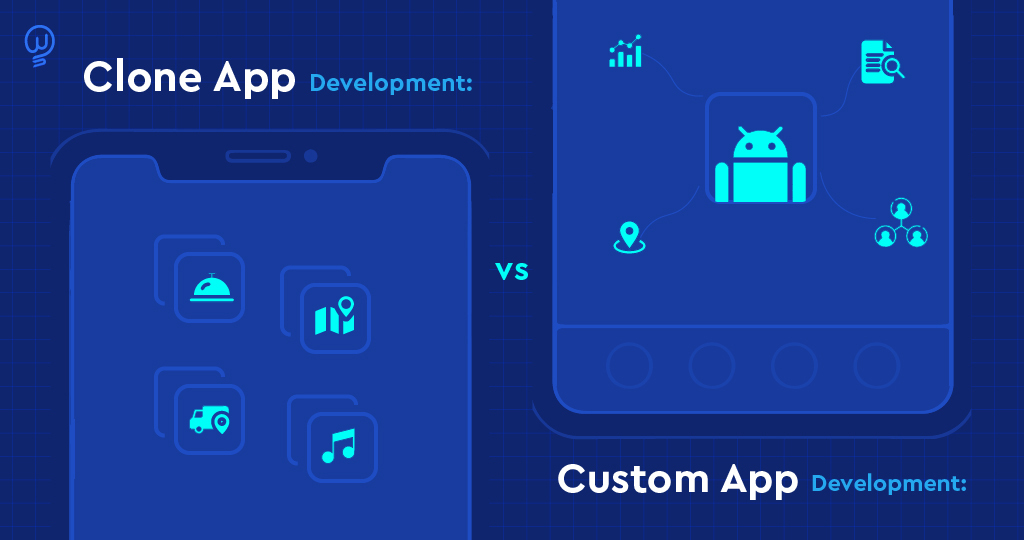Are you thinking of building a mobile app but unsure if you should clone an existing one or develop a custom solution? This blog explores the pros and cons of both clone app development and custom app development to help you make the best decision for your business. We'll cover the benefits of each approach, including scalability and customization.
Key Takeaways
Cloned Applications replicate existing ones but may lack uniqueness and pose legal risks.
Custom Applications cater to specific needs, ensuring efficiency, security, and better customer relations.
Customization Benefits include streamlined operations, secure data handling, easy maintenance, and enhanced customer engagement.
For businesses, while clones offer initial cost savings, custom apps provide long-term advantages like scalability and customer attraction.
What Is Clone Application Development?
Cloning an application refers to taking inspiration from a website or application whose outlook is different, and unique from the rest and creating another application similar to that one. It is often misinterpreted as copying the same application or website. But that is not the case.
Cloning means taking ideas from the original application, adding unique features, and developing a similar-looking application. For entrepreneurs who wish to start their own businesses through an application, app cloning is the best way out for you. On-Demand Clone App Development Companies can clone two applications at a time. Embibe, an app cloner, has about 10,000,000+ installs, according to recent data analysis.
Benefits Of Clone Application Development
Listed below are some advantages associated with cloned applications:
Customizable: A cloned application gives the original developer full access to edit and customize the applications according to their requirements. They can even add unique features and mobile app development languages to their application while cloning the other app.
Cost-Effective: Cloned applications are a replica of apps that are already famous in the market, so the cost of developing a copy of the original one from scratch is very minimal and can provide the best language for app development.
Effortless: While developing an application, some initial work is required, like market research, planning, and execution. In the case of cloning an application, the initial work is already carried out by the original app developer, which saves time for the clone app developers.
Raise in Chances of Success: Cloned applications are a replica of those that already exist in the market and are good app development companies. They are among the most famous applications and are used by the majority. Because of this, the popularity of the cloned apps in the market will be the same as that of the original application.
Cons of Clone Application Development:
Limited Differentiation: Clone application development often results in products that closely resemble existing ones. This lack of differentiation can make it challenging to stand out in the market and may lead to difficulties in attracting users or customers.
Legal Issues: Clone applications may infringe upon existing copyrights, patents, or trademarks, leading to potential legal complications. Even if developers attempt to avoid direct copying, similarities in functionality or design could still raise legal concerns.
Risk of Poor Quality: Creating a clone application doesn't guarantee the same level of quality as the original. Rushing through development to replicate features can lead to bugs, security vulnerabilities, and user experience issues that harm the reputation of the product and the brand.
Dependency on Original: Clone applications often rely on the success and popularity of the original product. If the original loses its market share or faces significant changes, the clone may suffer as well, making it a riskier investment compared to developing a unique solution.
What Is Custom Application Development?
Custom application development means creating custom software for a particular organization's users to cater to their organizational needs. The mobile app development languages are according to the preferences of the users of that company. A custom application is contrary to the traditional applications used by other companies.
Since this application is specialized for the original company itself, full-stack app development companies have complete access to it, and any issue regarding the app can be solved quickly and efficiently. According to recent reports for 2024, nearly 82% of the companies outside information technology-based companies are using custom-developed apps.
Benefits Of Custom Application Development
Here are some magnificent advantages of custom app development:
Improved Efficiency: The app developers make custom applications to suit the company's requirements. It caters to the users' basic needs and is the best language for the app development of the concerned company. These applications negate all the unnecessary features of other applications that are of no use to the company. In this way, users can efficiently work without any hindrance. Custom mobile app development services are elevating the overall brand experience.
Secured Application Data: Custom Android app development services help businesses take a holistic approach to business. Business applications used by the masses may or may not have relevant security benefits to keep your business data secure. While developing custom applications, Clone App Development Company can add strong security measures to keep business data safe. You can even retrieve the same in case you lose your record. Access to these applications is in the hands of the users of the original company only.
Easy Maintenance: There are high risks if you use regular business apps for your daily operations. In any case, if the original app developer decides to discontinue the application, then your company might face a hindrance in its regular operations. A custom application is a solution to this problem. Customized applications of a company work according to the company's needs, and the users of that particular company do not have to depend on someone else.
Improved Relationship With Customers: Through custom-developed applications, the users can directly interact with the customers regarding their products and provide them with more efficient services. In addition to this, the users can also access the customer's details and receive valuable feedback. It will help in developing a better relationship with the customer. Many app development companies on the market are taking the customer experience to the next level. As the market has become highly customer-centric, the need to think outside the box has pushed app development companies to adopt new strategies.
Cons of Custom Application Development
Higher Cost: Custom application development typically involves more time, effort, and resources compared to using pre-built solutions or templates. The need for specialized expertise and tailored development processes often results in higher upfront costs.
Extended Development Time: Building a custom application from scratch usually takes longer than using existing frameworks or platforms. The process involves thorough planning, design iterations, and development phases, which can delay time-to-market and potentially impact business objectives.
Complexity in Maintenance and Updates: Custom applications may require ongoing maintenance, updates, and support, which can be complex and resource-intensive. As technologies evolve and business requirements change, keeping the application up-to-date and compatible with new environments becomes a continuous challenge.
Risk of Over-Engineering: Without clear requirements and a well-defined scope, custom application development projects run the risk of over-engineering. Developers may introduce unnecessary features, complexity, or technical debt, leading to bloated codebases, performance issues, and difficulties in scaling the application.
Clone App vs Custom App Development- Which Is Better For Your Business?
Each application, whether cloned or customized, has its pros and cons. As per the 2021 record, over $189 billion in revenue is generated from mobile application development. Looking at the rate at which businesses are growing these days, there is a dire need for mobile application development for each business. It is generally seen that companies and big businesses opt for custom application development instead of cloning applications. The main reason behind this is that custom applications serve the needs of the company's daily operational requirements, excluding all unnecessary features. The cloned applications are similar copies of already-existing applications. Because of this, the scalability of the cloned apps is not good. On the contrary, custom apps are developed from the basics and cater to the needs of the business.
Custom applications are developed so that whatever functions and features the company will require are only built-in. It is the best programming language for mobile app development, and no unnecessary features are added, making it easy for users. On the other hand, cloned applications do not provide quality design and functions. Since it is the first copy of an existing application, there are poor functionality and complexity problems too. When you use a cloned application, you get access to some good and unwanted features. It negatively impacts the customer, as they are always looking for different features. In such cases, custom applications are the only solution available. Since these applications are personalized, there are greater chances of customer attraction. The users can also give better services to the existing customers of the company.
The Bottom Line
We can see that custom-developed applications hold more significance than cloned applications. Custom-developed applications have proven to be more beneficial for companies and big businesses regarding efficient working and better customer relations.
But, clone app development goes easy on your pocket. It is a viable choice for many startups that are trying to bring a new idea into the market. The best programming language for mobile app development provided by custom-developed applications is of great value. As a recommendation, if you are starting up a new business through an application, try to opt for custom-developed applications.







